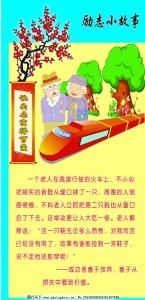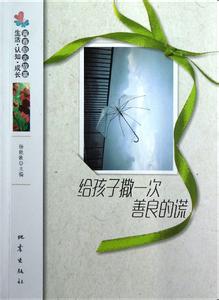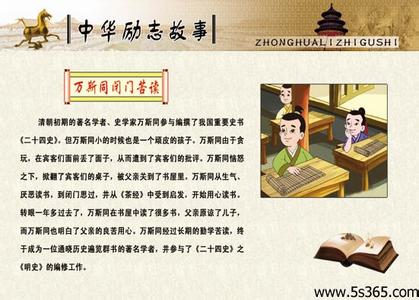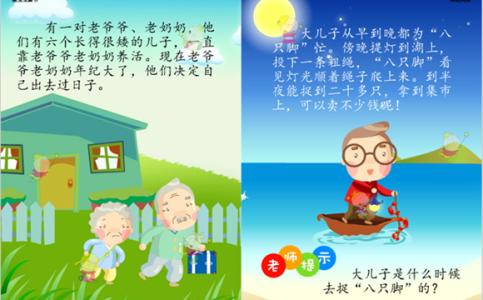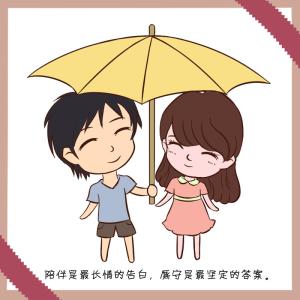让孩子们多看一些英文短篇励志故事是好的,总会有所收获,那么英文短篇励志故事都有哪些呢?一起来看看吧。
英文短篇励志故事:入木三分
To have an image of bamboo in one's mind
Wang Xi-zhi is one of the most famous calligraphers during the Eastern Jin Dynasty of China. When he was very young, he practiced his art every day and never stopped.
Later he absorbed the strong points of all the other schools of calligraphy, and developed his own unique style of writing. Because of his achievements, he has been honored as one of China's sages of calligraphy.One time, Wang Xi-zhi sketched in wood for an engraver to cut. Then the engraver found the ink had penetrated one centimeter into the wood.
"Ru Mu San Fen" is got from this story, which means the calligraphy is penetrating.
Now it is often used to describe expressing sharp ideas or profound views.
入木三分
王羲之是中国东晋时代一个很有名的书法家,他从小就刻苦练字,从不间断,以后又吸取了各个不同书法派的优点,形成他自己独特的个性。因为他在书法上的成就,人们都尊称他为中国书法界的“圣人”。
有一次,王羲之在木板上刻字,后来刻字的人发现墨汁渗入木板有三尺深。
“入木三分”就是从这个故事中得出来的,用来形容书法有力,现在多用来比喻分析问题很深刻。
英文短篇励志故事:一技之长
Proficiency in a particular line
Gong sun Long , is a famous scholar lived in the State of Zhao during the Warring States Period (475-221BC). He had kept a circle skilled people around him. He often said, "A wise man should welcome anyone with a specialty."
One day, a man dressed in tattered and dirty clothes came to see him and said to him:" I have a special skill. "
Gong asked: "What is it?"
"I have a loud voice and I'm good at shouting."
then Gong turned to his followers and asked," Who is good at shouting?" But none of them answered "Yes ". So the scholar took the man in.
Some days later, Gong and his followers went on a trip. they came to a wide river and found the ferryboat was on the other side of the river. All of them had no idea. Suddenly, Gong thought of the shouting expert and turned to him, "Can you have a try?" The man realized it was the chance to show his skill. He shouted to the ferryman as loud as he could, "Hey, ferryman, come here, we want to cross the river." As his voice ended, the ferryman came to fetch them. Gong was very satisfied with the new follower.
Later, people use it to describe anyone who has a special professional skill.
一技之长
战国时期,赵国有位名士叫公孙龙。他手下聚集了许多有自己特长的门客。他常说:"一个聪明人应该善于接纳每一个有自己特长的人。"
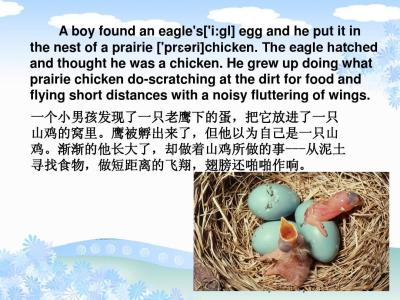
一天,有一个穿着很破烂的人来见他,并向他推荐自己:"我有一项特别的本领。"公孙龙就问道:"什么本领?"那个人回答道:"我声音特别大,很善于叫喊。"公孙龙听了,就转身问他旁边的门客:"你们有谁善于叫喊?"结果没有一个人回答"是"。于是,他就收下了这个很善于叫的人作他的随从。
没过多久,公孙龙和他的门客一起出外游玩。他们来到一条很宽的河边,发现渡船在河的另一头,所有人都不知怎么办好。突然,公孙龙想起他最近收的那个人的本领是善于叫,于是,他就转过头去对那人说:"你大声叫对面的船夫,看能不能把他叫过来。"那人觉得展示他技能的时候到了,就尽力大声向对面喊:" 喂,船夫,过来,我们要过河。"当他叫声刚完,那对面的船夫就摇着船过来了。公孙龙对这个新收的门客非常满意。
后来,"一技之长"就用来形容一个人有一项特殊的本领。
英文短篇励志故事:不合时宜
Ignorance of the objective world
In the State of Lu, there was a couple of husband and wife, the former being an expert shoemaker and the latter a skilled hand in wearing taffeta. One day after consultations they decided to go to the state of Yue to earn a livelihood. The neighbors advised them not to go when they learned about their plan. "Don't go there," said one neighbor, "If you go, you can never earn a livelihood."
"We cannot understand you," interrogated the couple, "We have a find command of our art, how could we not earn our living with our work? Don't make a fool of us, please."
"Indeed, you have your skill," explained the man, "But have you taken notice of the fact that shoes are made for people and the silk taffeta are for hat-making? The people of Yue don't wear shoes, for they are barefooted. Again, they like to have their hair spread out over their heads and they never use hats. To whom should you sell your shoes and hats then?" Experienced though you are in the arts, yet the arts you have mastered are useless there."
After this explanation, the husband and wife now understood that anything that was not adaptable to the objective world would be useless and unpractical.
不合时宜
鲁国有对夫妻,男的是鞋匠,鞋子做的很好;女的是织绢能手。有一天,他们商量想到越国去谋生。消息传到四邻后,有人对他们说:"不要到那儿去!否则你们一定无法生存的!"那对夫妇说:"我们不明白你的意思, 我们都有一套手艺,怎么 会生活不了呢?别胡说了!" 那人说:"对呀,你们虽然都有一套手艺,可是你们要知道,鞋子是给人穿的,但越国人都赤脚不穿鞋子,你们织的丝绢原是做帽子用的,但越国人喜欢披着头发,不戴帽子,你们的本领虽大,手艺虽高,但你们做的鞋子、帽子去卖给谁呢?那对夫妇这才明白,凡事如果不合时宜,不适合客观环境就不中用了。
 爱华网
爱华网